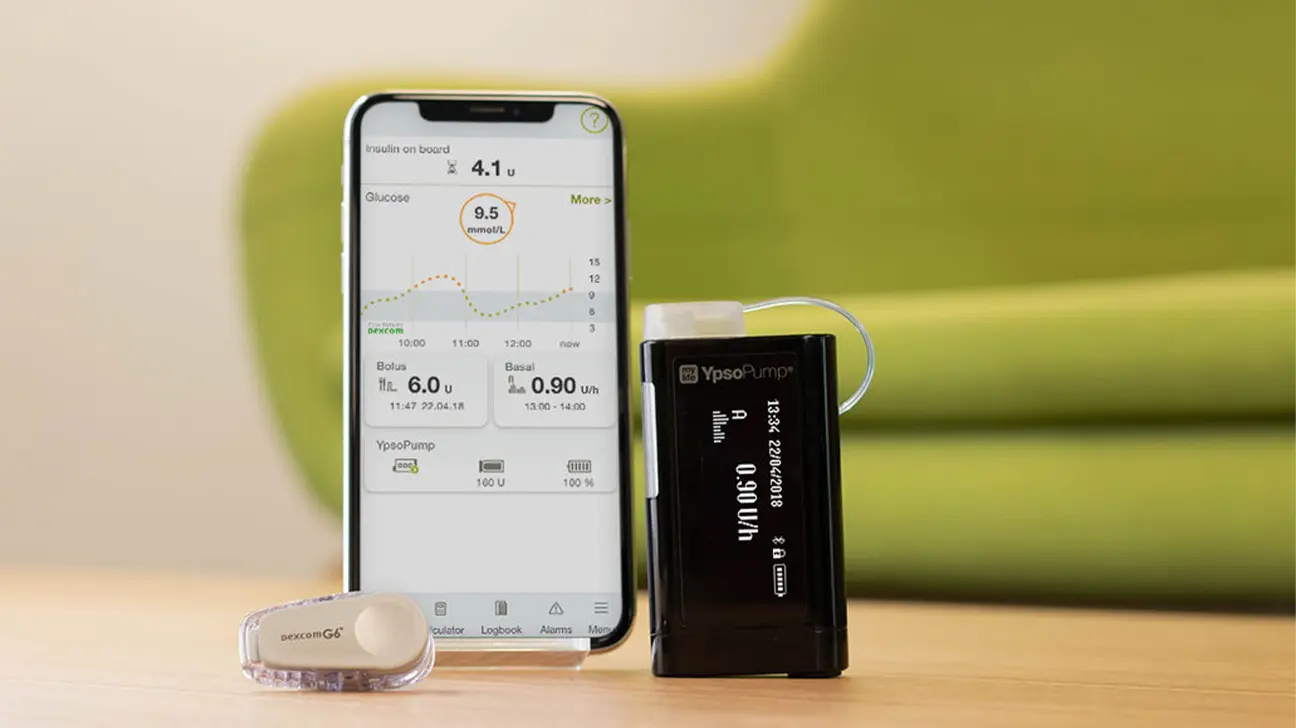What is an insulin pump?
An insulin pump is a small device that delivers a continuous supply of insulin through a thin flexible tube (cannula) inserted under the skin. The pump holds a reservoir filled with rapid acting insulin, and is programmed to give small amounts of insulin continuously. When you need extra insulin before meals or before a snack, you push the buttons on the pump or app on your phone to deliver the right amount of insulin to match the carbohydrates you eat. The infusion set or pod that contains the cannula is changed every 2 or 3 days. Newer pump features allow for increased safety and better insulin management, as the pump can automatically make adjustments to insulin infusion rates to prevent both low and high blood sugar levels.

What to consider if you are thinking about a pump:
Advantages
- Can provide better blood glucose control
- Allows more flexibility to adapt to day to day life
- Convenient because it is always with you
- Fewer injections
- Fewer and less severe low blood sugars
Disadvantages
- Something is always attached to you
- More rapid onset of Diabetic Ketoacidosis (DKA) if there is an interruption in the insulin delivery
- There is a lot of education and ongoing follow-up required to be successful with an insulin pump
|
 |
Questions to ask yourself:
- What do I expect from pump therapy?
- How will a pump fit into my daily life?
- How do I feel about having a pump attached to me at all times?
- How will a pump affect times of intimacy?
- Have I talked to someone who is using a pump?
- Am I willing to test my blood sugars a minimum of 4 times per day?
- Do I rotate my injection sites?
- Am I willing to learn and do carbohydrate counting?
- Am I willing to visit the Diabetes Education Centre for regular follow-up?
- Am I comfortable making insulin adjustments based on my blood sugar results?
|

|
Next Steps:
- Arrange an appointment with your Diabetes Education Program to discuss pump therapy
- Speak to your diabetes specialist/endocrinologist
- Review all pump company websites and decide which pump you like
- Keep blood sugar and food records
- Check to see if you have insurance coverage through your benefit plan
- If you meet the criteria for funding through the Assistive Devices Program (ADP), your diabetes team will initiate the required paperwork
ADP-Approved Insulin Pump Programs
| Program |
Location |
Population
(Adults or Pediatrics)
|
Phone Number |
|---|
| Langs Community Health Centre |
1145 Concession Rd, Cambridge |
Adults, Pediatrics |
519.653.1470 ext.285 |
| Diabetes Care Guelph |
83 Dawson Rd, Guelph |
Adults |
519.840.1964 ext.3 |
WRHN@Midtown
Previously Grand River Hospital
|
835 King St W, Kitchener |
Adults |
519.749.4300 ext.2622 |
WRHN@Midtown
Previously Grand River Hospital (Pediatrics)
|
835 King St W, Kitchener |
Pediatrics |
519.749.4300 ext.2491 |
| Groves Memorial Hospital |
131 Frederick Campbell St, Fergus |
Adults |
519.843.2010 ext.44101 |
| Guelph General Hospital |
115 Delhi St, Geulph |
Pediatrics |
519.837.6440 ext.2784 |
| Louise Marshall Hospital |
525 Dublin St, Mount Forest |
Adults |
519.323.3333 ext.74601 |
| Palmerston and District Hospital |
500 Whites Rd, Palmerston |
Adults |
519.343.2030 ext.80209 |
Insulin Pump Companies
Funding Assistance for Insulin Pumps
The Assistive Devices Program (ADP) through the Ontario Ministry of Health and Long Term Care (MOHLTC) provides funding to support you with an insulin pump. If you meet the eligibility criteria for a pump, 100% of the price of your pump is covered and paid directly to the supplier. You will also receive a $2400 grant paid to you 4 times/year to help cover the cost of your supplies. You must attend one of the ADP approved Diabetes Education Programs. For a referral to a program near you, click here.
For more information on the ADP program for insulin pumps, please click here
|